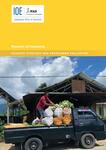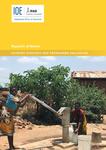Page Header

Downloads:
1
Democratic Socialist Republic of Sri Lanka Country Strategy and Programme Evaluation
Overview
In a context characterised by the end of a long standing conflict and recovery from the Indian Ocean Tsunami, IFAD-supported projects have contributed to improved agricultural production and productivity in several districts throughout the Democratic Socialist Republic of Sri Lanka. Such outcomes were achieved through activities including support to smallholder farmers to establish or upgrade tea and rubber plantations, rehabilitate irrigation schemes and access improved technologies. These achievements were the main contributing factors for increased incomes and assets. The projects also succeeded in improving access to markets and finance and in income diversification. On the other hand, the improvements in agricultural production were not necessarily driven by improved and innovative technologies which promoted resource use efficiency (e.g. water) or strengthened climate resilience. Furthermore, in pursuing partnerships with agribusinesses, there was scope for more careful consideration on how to ensure added value of public funding. The report recommends that future operations pay greater attention to promoting innovative technologies which also strengthen climate resilience and that IFAD and its partners explore ways to innovate and leverage more systemic improvements in the rural finance sector in Sri Lanka. The evaluation also underlines that IFAD should look to play a more catalytic role, going beyond individual investment projects.Report Details
| Year Published | |
| Type | |
| Joint | No |
| Partner/s | N/A |
| Consultant name | |
| Agency Focal Point | Fumiko Nakai |
| Focal Point Email | f.nakai@ifad.org |
| Managed by Independent Evaluation Office | Yes |
| Country/ies |
YOU 'RE READING
Democratic Socialist Republic of Sri Lanka Country Strategy and Programme Evaluation








